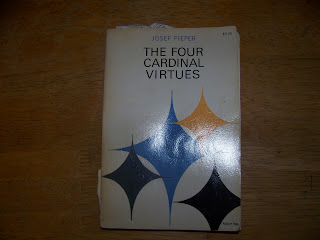 |
| The Four Cardinal Virtues, by Josef Pieper |
Now I'd like to share one particularly helpful insight that I got out of it.
Pieper speaks of the limited usefulness of casuistry - the laying out of morality in particular examples - and then, in speaking of its limitations, he quotes [my bold emphasis]:
"Casuistry, on the contrary, carried to excess, substitutes techniques and prescriptions for the infinite suppleness which the virtue of prudence must retain in the face of the complexities of the ethical life," as we read in a French commentary to the Summa Theologica.
Now, in all honesty, it took me most of the first section before I finally figured out that the classical notion of "prudence" means something like "knowing the right thing to do in a given situation". So Pieper1 is saying that life is infinitely complex, and therefore any set of rules you come up with about how to behave - no matter how complicated - will necessarily be an over-simplification of reality.
Prudence is infinitely supple.
So then I happened to be driving one day.
I pulled to a stop in a left-turn lane behind another car. Waiting for the signal to turn, I started wondering if I should pull up a little. This sent me into a spiral of thoughts that looked something like this...
There's all those times where the cars from the turn-lane stretch back so far they block the driving lane; clearly in those cases it would be helpful if all the cars pulled forward as much as they can, so no one gets blocked - but you can't pull too far forward or you risk hitting the car ahead of you, of course. And if someone comes too fast from behind and rear-ends you, then you want to have more space between you and the car ahead so that you don't hit them. And if you had a whole line of cars who had pulled forward in the turn-lane so as not to block the other lanes, and someone came along too fast, you could get the whole line of cars hitting each other. If you can see behind you that the cars are not blocking the other lane, then it's ok to stay back. But a lot of time you can't see around the cars well enough to know if they're blocking or not. So you have to guess. Or if God tells you to pull forward or stay back, you could go with that - if you can figure out whether he's really telling you something or not. Maybe you should just figure that it's better to play it on the safe side and stay back, and accept lane-blocking as the price of safety. Or maybe you should just figure that it's better to pull forward, because it's a lot more likely that you'll end up blocking the lane than that someone behind you will rear-end you into the car ahead.
Eventually, the phrase filtered into my head... infinite suppleness.
I realized that my train of thought wasn't just impractical. It was impossible - even in theory - to work out what you should do in every single case. Because the variety of situations isn't just beyond my grasp, it's infinite. That's why we need prudence and God's guidance in the first place: so we know what to do right now even when we don't have, and couldn't possibly have, every single case figured out.
So I tossed out the whole fruitless line of thought, and a peaceful sense of freedom came over me.
It turns out, I do this kind of thing quite a lot, and "infinite suppleness" is becoming my new rallying cry.
1. And, apparently, some French commentator, as well as Thomas Aquinas.


No comments:
Post a Comment